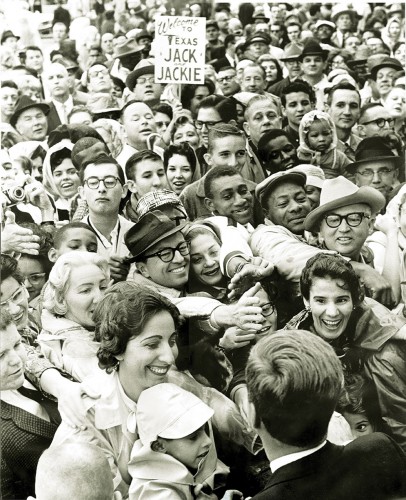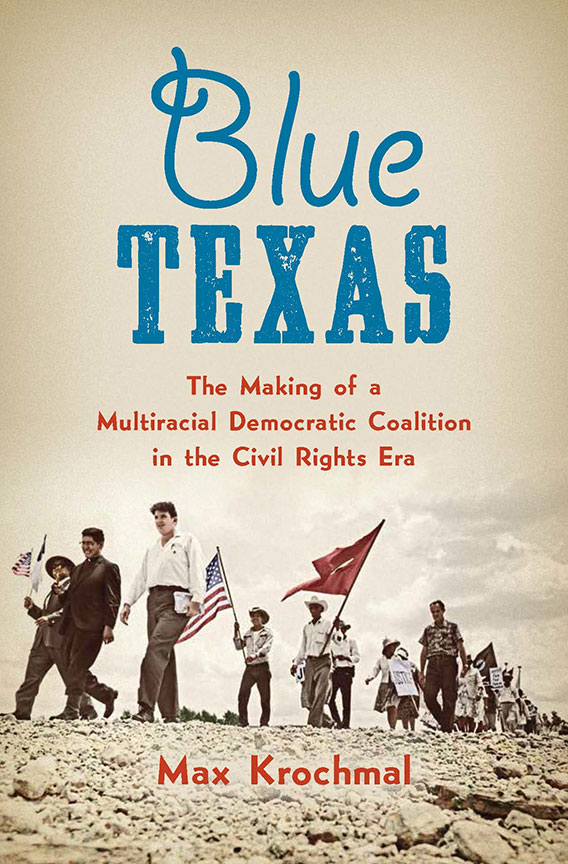Max Krochmal on the Liberal Roots of Texas
History professor’s new book examines the power of multiracial Democratic coalitions in mid-20th century Texas.

Krochmal's Civil Rights in Black and Brown oral history project won a $200,000 grant from the National Endowment for the Humanities.
Max Krochmal on the Liberal Roots of Texas
History professor’s new book examines the power of multiracial Democratic coalitions in mid-20th century Texas.
While many perceive Texas as a place dominated by “cowboy conservatism,” Max Krochmal has evidence of a robust liberal tradition in the Lone Star State.
Krochmal outlines the cooperation and successes of African-Americans, Mexican-Americans and white labor and liberal groups in Texas during struggles for civil rights and economic justice in the mid-20th century in his new book, Blue Texas: The Making of a Multiracial Democratic Coalition in the Civil Rights Era (University of North Carolina Press). The assistant professor of history’s work is scheduled for release in August 2016.
“The book follows a diverse group of activists from the workplace to the neighborhoods and into electoral politics as they experimented in building coalitions across the color line,” said Krochmal. “Those coalitions were rooted in deep interpersonal relationships and broad social movements and gave life to a rather powerful liberal wing of the Democratic Party in the 1960s — and in the process those older coalitions teach us something about efforts to turn Texas blue today.”

The multiracial composition of the Texas Democratic party helped John F. Kennedy win the presidency.
Blue Texas connects civil rights in terms of specific objectives — such as the desegregation of lunch counters — to the broader aims of the movement, including the struggles for political power and economic opportunities.
“My book will be the first that connects those two civil rights movements to each other and to the electoral arena and to the history of working people and of organized labor,” said Krochmal. “And it will be one of the first to do that nationally — not just focused here in Texas.”
Blue Texas illustrates how African-Americans, Mexican-Americans and white labor unions worked together for tactical political alliances that produced a large-scale movement for liberalism in the state.
Encompassing almost a decade of research, Blue Texas draws from oral history interviews conducted by Krochmal and others. The research also included newspapers and manuscripts from private and public collections from across the state.
“When I went into it, I had no idea I’d end up writing about the Democratic Party and liberal politics but that turned out to be where so many of these relationships were being forged and where some of the civil rights battles were being fought,” said Krochmal.
“Those coalitions were rooted in deep interpersonal relationships and broad social movements.”
Max Krochmal
One thing that made the Democratic coalition so effective in the 1960s was participants’ ability to talk about differences in a way that often paralyzes 21st-century conversations, he said. “By putting those conflicts on the table and making them a point of discussion, they were able to circumvent them in a way that the present-day Democratic Party hasn’t figured out.”
Blue Texas shows that the multiracial wing of the Democratic Party had the greatest success when it was rooted in expansive and aggressive social movements. The success of the liberal wing of Democrats in the 1960s was rooted in the robust African-American and Mexican-American civil rights movements, he said.
“Today’s electoral politics are not often rooted in well-organized masses of ordinary people,” said Krochmal. “The book shows how it’s difficult for politicians to do much without that base. For people interested in seeing Texas moving in a more liberal direction, it’s not enough to just go vote. They also need to organize their communities.”
Stories from those who were there

TCU history professor Max Krochmal will release a new book in August 2016 highlighting the multiracial Democratic roots of Texas during the Civil Rights era.
A part of Max Krochmal’s research focus is collecting oral histories from civil rights activists whose stories have not been recorded and preserved. He is the project director for “Civil Rights in Black and Brown: Oral Histories of the Multiracial Freedom Struggles of Texas, 1954-Present,” which is located at TCU’s history department and the library.
The collaborative digital humanities project includes faculty and library staff from TCU, the University of Texas at Arlington and the University of North Texas. Recently, the project received a $200,000 grant from the National Endowment for the Humanities. This adds to a $100,000 grant from the Brown Foundation Inc. of Houston and a $40,000 grant from the Summerlee Foundation of Dallas.
The project researchers are creating The Civil Rights in Black and Brown Interview Database, a free website of digital video clips. Instead of streaming full interviews or displaying transcripts — which can be burdensome to sift through — the site indexes videos and embeds metadata codes and tags, making it easy to search for detailed information in the collection as well as to add tags to help future users.
Krochmal and his co-directors are uploading and tagging 40 oral histories. Graduate students collected oral histories during the summer in the Fort Worth-Dallas area, adding another 100 interviews. With additional funding, the project leaders hope to expand the field research focus to another dozen areas across the state.

Your comments are welcome
Comments
Related Reading:
Campus News: Alma Matters
ReFrog Initiative Turns TCU Move-Out Waste into Community Donations
TCU’s ReFrog initiative collected 16,500 donated items during 2025 move-out week, diverting 74 dumpsters worth of goods from the landfill.
Campus News: Alma Matters
TCU Senior Mark Sayegh Builds One Shade Greener Into Multi-Campus Environmental Nonprofit
A student movement tackles food insecurity through campus cleanups and community gardens across seven universities.